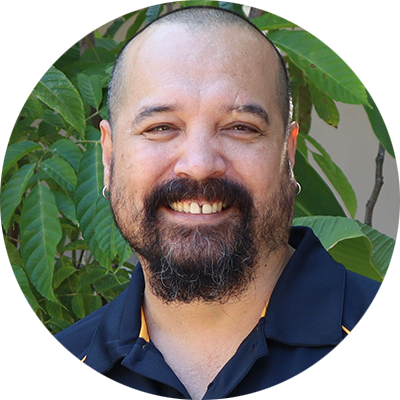Aboriginal and Torres Strait Islander males remain the lowest users of primary healthcare services in Australia, with poorer overall health, higher rates of chronic disease and hospitalisation, and lower life expectancy. Remoteness and socioeconomic disadvantage are frequently identified as contributing factors, but a Flinders University researcher contends that there’s another element which needs to be tackled – changing how males are treated within the health system. Associate Professor Kootsy Canuto has made this the focus of his studies, and he has clear ideas of how it must progress.
Associate Professor Canuto was born and raised on the traditional lands of the Yidinji people and identifies as a Torres Strait Islander, belonging to his father's people, the Wagadagam clan of Mabuiag Island. Now a Matthew Flinders Fellow working with Flinders Rural and Remote Health NT, based in Darwin, he’s leading pivotal research initiatives, including a Medical Research Future Fund (MRFF) project to examine male social and emotional wellbeing.
“This is a critical challenge for Aboriginal and Torres Strait Islander males, who have the highest rate of suicide in Australia,” he explains.
“The government has to appropriately resource primary healthcare services, especially Aboriginal Community Controlled Health Organisations and Aboriginal Medical Services, to meet the needs and wants of the Aboriginal and Torres Strait Islander men of their respective communities,” says Associate Professor Canuto.
“Without the resources to develop, accommodate and evaluate the services and programs, no amount of advocacy, research evidence or anecdotal evidence will change the low utilisation of primary healthcare services by Aboriginal and Torres Strait Islander men.
Associate Professor Canuto is part of a team of specialist researchers at Flinders dedicated to Aboriginal and Torres Strait Islander people’s health, which includes life partner Associate Professor Karla Canuto, and Deputy Dean of Rural and Remote Health Professor James Smith.
“There has been enough research done in this space to understand the problems; our research focuses on finding sustainable solutions and implementing them – but that’s easier said than done.”
“There has been enough research done in this space to understand the problems; our research focuses on finding sustainable solutions and implementing them – but that’s easier said than done.”
“We know the barriers and enablers to meet the needs and wants of the Aboriginal and Torres Strait Islander men of their communities,” Associate Professor Canuto says. “This is a structural and systemic challenge that needs to be tackled by those in power, but to ensure the sustainability of change, it must be supported appropriately with trained staff to create men’s-only primary healthcare services.”
He is working with Watto Purrunna Aboriginal Health Care Service (an Aboriginal Medical Service provided through SA Health) to provide Aboriginal and Torres Strait Islander males with a safe space to come together and enjoy a meal while they meet and build rapport with health service staff. This connection to build trust and exchange information is a crucial foundation, necessary for greater interaction between Aboriginal and Torres Strait Islander males with health care professionals to flourish.
Thanks to an NHMRC Investigator grant, a project called ETTA (Enough Talk, Time for Action) has enabled Associate Professor Canuto and fellow researchers to conduct the first of four iterations of qualitative interviews in Port Adelaide with Watto Purrunna staff and participants. These gatherings have not only enabled men from Aboriginal and Torres Strait Islander communities to connect with each other, but also built their confidence in discussing and requesting information or appointments to address health issues, whether it be seeing a GP, Aboriginal Health Practitioner or Social and Emotional Wellbeing Worker.
“Unless primary healthcare services are resourced appropriately to develop, accommodate and evaluate the services and programs they deliver to the Aboriginal and Torres Strait Islander men of their community, no amount of advocacy, research evidence or anecdotal evidence will change the low utilisation of primary healthcare services by Aboriginal and Torres Strait Islander men,” he contends.
The ETTA project is expected to be completed by December 2024, and Associate Professor Canuto says presenting the research findings back to the Watto Purrunna staff will enable the health service to keep improving its service delivery and increase the numbers of its successful interactions with Aboriginal and Torres Strait Islander males.
The findings will also allow Watto Purrunna to roll out similar engagement activities throughout the Northern Adelaide Health Network, and hopefully be adapted by other Aboriginal Medical Services and Aboriginal Community Controlled Health Organisations throughout Australia. “However, there must be a commitment from governments to follow through,” says Associate Professor Canuto. “If a roll-out of services is not adequately and sustainably resourced, there’s little that these services will be able to develop, implement and evaluate that can improve the numbers of men engaging with health services.”
Associate Professor Canuto is also working with the Nauiyu Community in the Northern Territory and at Waiben in Zenadth Kes (Torres Strait Islands), co-designing social and emotional wellbeing programs for Aboriginal and Torres Strait Islander males – thereby developing a framework for other health services to follow in other communities.
This MRFF project ends mid-year 2026, when its assets will be available to all Aboriginal Community Controlled Health Organisations and Aboriginal Medical Services, and able to be modified to each community’s own specific needs.
This work depends on carefully constructing ongoing relationships, which takes time – and progress has been hampered through disruptions caused by COVID-19, especially Associate Professor Canuto's work with health services in very remote locations. “It just reminds us that what we are trying to achieve is a very difficult process, but it is absolutely essential.”
“It just reminds us that what we are trying to achieve is a very difficult process, but it is absolutely essential.”
Download your free copy of Fearless Research
![]()
Sturt Rd, Bedford Park
South Australia 5042
South Australia | Northern Territory
Global | Online
CRICOS Provider: 00114A TEQSA Provider ID: PRV12097 TEQSA category: Australian University










